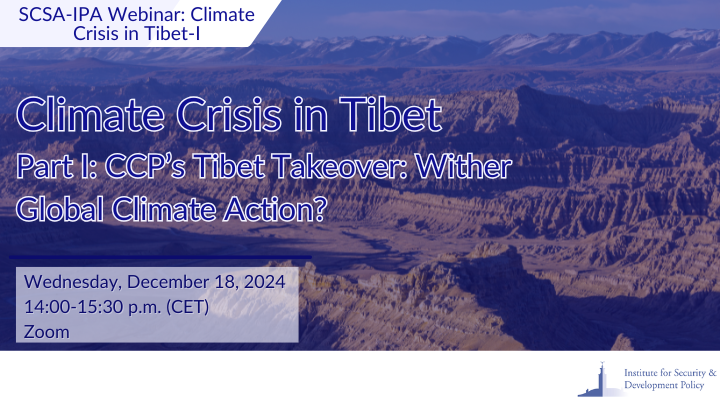Climate Crisis in Tibet – Part I: CCP’s Tibet Takeover: Wither Global Climate Action?

Did you miss this webinar? The full recording is available on ISDP’s YouTube channel.
The Tibetan Plateau (also called the Roof of the World and the Third Pole) spans around 2.5 million square kilometers and is rich in biodiversity and natural resources, with implications for the wider world. It is part of the wider Hindu Kush Himalayan region encompassing eight countries (namely Afghanistan, Bangladesh, Bhutan, China, India, Myanmar, Nepal, and Pakistan).
Importantly, it contains the largest reservoir of ice on earth after the Arctic and Antarctica, which includes storage of layers of permafrost – a permanently frozen (for two years or more) layer comprising sand, gravel, organic matter, and ice – vital for maintaining the balance of the regional and global ecosystem. However, the Tibetan ecosystem has been majorly impacted by the accelerating climate change, as well as China’s rapacious so-called “developmental” aims and repressive political measures, including cultural annihilation and Sinicization.
In terms of Tibet’s climatic conditions, global warming has hastened extreme events such as permafrost thawing, glacial melting, earthquakes, water shortage, and floods. In particular, the increased rate of permafrost thawing in the plateau will have grave and even unknown repercussions, including but not limited to the release of greenhouse gases into the atmosphere.
In this context, it is important to examine what strategies and policies China’s Xi Jinping-led ruling regime, the Communist Party of China (CPC) is pursuing in Tibet. This will help in gaining a truer perspective by weeding out benign- or even constructive-sounding rhetoric (e.g., exploring China’s true aims for developing a “system of nature reserves in Xizang”).
Notably, China’s white papers have provided useful insight into the CCP’s (Chinese Communist Party) approach toward Tibetans and the Tibetan region in general. The repressive governance over Tibet, including assimilation, tortures, disappearances, and exploitation (infrastructure and resources), is veiled in the rhetoric of “liberation” and development. The CCP also exerts control through disinformation mechanisms that are focused on curbing any sentiments that encourage ideas of independence or meaningful autonomy.
The projection of the revered Dalai Lama as a “reactionary,” secessionist force is another aspect of the CCP’s vitriol against Tibet. At the same time, the CCP has not left any stone unturned to assume control of Tibetan Buddhism, including interference in the Dalai Lama’s succession (e.g., hosting Tibetan Buddhist monks for a training session on reincarnation for a living Buddha in the Tibet Autonomous Region).
Naturally, such religious and cultural repression cannot be separated from the environmental degradation that has been sped up by the CCP’s policy frameworks. China is looking at various tools to legitimize Chinese rule over Tibet. For instance, Beijing’s use of the term “Xizang” over “Tibet” in its last white paper seeks to completely destroy Tibet’s global identity.
In terms of the environmental landscape, be it CCP’s relocation projects or the pillaging of traditional Tibetan villages, most policies that make way for “green” development aims such as national reserves are shrouded in doubt. Tibetan observers have often called out China’s lawfare measures such as the new “Qinghai-Tibet Plateau Ecological Protection Law” as a means to control Tibetan resources.
Rightfully, Tibet and its resources – from water to minerals – have assumed a geopolitical focus with security implications for the broader Indo-Pacific region. Yet in international forums, research centers, and institutions such as the UN’s Intergovernmental Panel on Climate Change (IPCC) or the Nepal-based International Centre for Integrated Mountain Development (ICIMOD) Tibetan concerns are officially routed through China, even as Tibetan researchers and activists have participated in UN climate change conferences, for example.
This webinar, the first in the series, seeks to address the following research questions:
- What is the nature and scope of the environmental degradation in the Tibetan Plateau?
- What is the extent and ambit of the CCP’s policies for governing Tibet that particularly impact Tibet’s environment?
- What are the projected objectives of the CCP vis-à-vis Tibet (e.g., development aims to end poverty)?
- And what is the true nature of its policy frameworks, including disinformation campaigns (e.g., via influencer management firms) and China’s persecution of Tibetan environmental activists?
- What has been the actual short-term and long-term impact on the Tibetan region and its people due to the CCP’s policies?
- How is China’s control of Tibetan territories, including religion and culture, impacting Tibet’s climatic conditions?
- Are the CCP’s actions, including militarization and laws, in Tibet that have repercussions on Tibet’s climate change irreversible?
- How can international multilateral forums, such as the IPCC, United Nations Framework Convention on Climate Change (UNFCCC), and ICIMOD, include Tibetan voices and concerns proactively without fear of Chinese retaliation?
Speakers:
 Dr. Ute Wallenböck is currently a Research Associate at the Department of Mongolian and Tibetan Studies at the University of Bonn. She has an academic background in Sinology and Tibetology, holding a PhD in Chinese Studies from the University of Vienna. Before Germany, she held previous academic positions in Austria (Vienna) as well in the Czech Republic (Olomouc and Brno). Her research centers on the Sinophone and Tibetophone borderlands, along with the Tibetan diaspora in Asia and Europe, exploring topics of identity, memory, and the significance of food in the context of cultural transmission.
Dr. Ute Wallenböck is currently a Research Associate at the Department of Mongolian and Tibetan Studies at the University of Bonn. She has an academic background in Sinology and Tibetology, holding a PhD in Chinese Studies from the University of Vienna. Before Germany, she held previous academic positions in Austria (Vienna) as well in the Czech Republic (Olomouc and Brno). Her research centers on the Sinophone and Tibetophone borderlands, along with the Tibetan diaspora in Asia and Europe, exploring topics of identity, memory, and the significance of food in the context of cultural transmission.
 Dr. Jonathan Ping is a political economist who specialises in the study of statecraft. His book Middle Power Statecraft established his hybridisation theory of the middle power concept. His work on statecraft has most recently been applied to great powers in articles such as Countering Hegemonism in the Indo-Pacific and books Chinese International Relations Theory, China’s Strategic Priorities and Chinese Engagements. He is an Associate Professor at Bond University, Founder and a Director of the East Asia Security Centre and Editor of the Journal of East Asian Security.
Dr. Jonathan Ping is a political economist who specialises in the study of statecraft. His book Middle Power Statecraft established his hybridisation theory of the middle power concept. His work on statecraft has most recently been applied to great powers in articles such as Countering Hegemonism in the Indo-Pacific and books Chinese International Relations Theory, China’s Strategic Priorities and Chinese Engagements. He is an Associate Professor at Bond University, Founder and a Director of the East Asia Security Centre and Editor of the Journal of East Asian Security.
 Dr. Mark S. Cogan is an Associate Professor of Peace and Conflict Studies in the College of Foreign Studies at Kansai Gaidai University in Osaka, Japan and a Senior Associated Research Fellow with ISDP. His research interests include Southeast Asia and the broader Indo-Pacific region, as well as security studies, peacebuilding, counter-terrorism, and human rights. He is a former communications specialist with the United Nations, serving in Southeast Asia, Sub-Saharan Africa, and the Middle East.
Dr. Mark S. Cogan is an Associate Professor of Peace and Conflict Studies in the College of Foreign Studies at Kansai Gaidai University in Osaka, Japan and a Senior Associated Research Fellow with ISDP. His research interests include Southeast Asia and the broader Indo-Pacific region, as well as security studies, peacebuilding, counter-terrorism, and human rights. He is a former communications specialist with the United Nations, serving in Southeast Asia, Sub-Saharan Africa, and the Middle East.
 Dr. Tsering Topgyal is a political scientist specialising in International Relations, Asian politics and security, Chinese politics, and Tibetan studies. He teaches courses such as Dilemmas in International Relations, International Politics of East Asia, Asia-Pacific Security, and Chinese Politics and Foreign Policy at the University of Birmingham. Dr. Topgyal’s primary research interest is the political and security aspects of contemporary Tibet. He is the author of the book “China and Tibet: The Perils of Insecurity” published in 2016, and scholarly articles in journals such as Asian Security, Journal of Contemporary China, Pacific Affairs, China Report etc. He is currently writing a book on China’s ‘Nationalities Policy’ with special attention to Tibet and Xinjiang. Dr. Topgyal volunteers on the Executive Council of the Universities China Council of London and previously served in the selection committee of the Dalai Lama Graduate Scholarship.
Dr. Tsering Topgyal is a political scientist specialising in International Relations, Asian politics and security, Chinese politics, and Tibetan studies. He teaches courses such as Dilemmas in International Relations, International Politics of East Asia, Asia-Pacific Security, and Chinese Politics and Foreign Policy at the University of Birmingham. Dr. Topgyal’s primary research interest is the political and security aspects of contemporary Tibet. He is the author of the book “China and Tibet: The Perils of Insecurity” published in 2016, and scholarly articles in journals such as Asian Security, Journal of Contemporary China, Pacific Affairs, China Report etc. He is currently writing a book on China’s ‘Nationalities Policy’ with special attention to Tibet and Xinjiang. Dr. Topgyal volunteers on the Executive Council of the Universities China Council of London and previously served in the selection committee of the Dalai Lama Graduate Scholarship.
Moderator:
 Dr. Jagannath Panda is the Head of the Stockholm Center for South Asian and Indo-Pacific Affairs (SCSA-IPA) at the Institute for Security and Development Policy (ISDP), Sweden. Dr. Panda is also a Professor at the Department of Regional and Global Studies at the University of Warsaw; and a Senior Fellow at The Hague Center for Strategic Studies in the Netherlands. As a senior expert on China, East Asia, and Indo-Pacific affairs, Prof. Panda has testified to the US-China Economic and Security Review Commission at the US Congress on ‘China and South Asia’. He is the Series Editor for Routledge Studies on Think Asia.
Dr. Jagannath Panda is the Head of the Stockholm Center for South Asian and Indo-Pacific Affairs (SCSA-IPA) at the Institute for Security and Development Policy (ISDP), Sweden. Dr. Panda is also a Professor at the Department of Regional and Global Studies at the University of Warsaw; and a Senior Fellow at The Hague Center for Strategic Studies in the Netherlands. As a senior expert on China, East Asia, and Indo-Pacific affairs, Prof. Panda has testified to the US-China Economic and Security Review Commission at the US Congress on ‘China and South Asia’. He is the Series Editor for Routledge Studies on Think Asia.